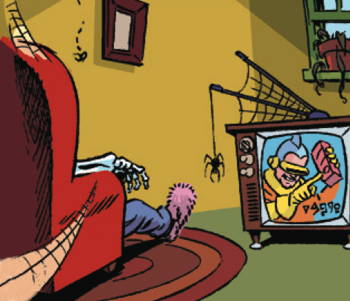November 2016
November 26, 2016
Marriage Bureau
Wait a minute--I don't see how the instant Tinder hookup booty-call sex happens!
Posted By: Paul - Sat Nov 26, 2016 -
Comments (3)
Category: Weddings and Marriage, 1940s
November 25, 2016
Beneficial Infertility
In 1977, the head of the National Peach Council, Robert K. Phillips, sent the following letter to the U.S. Department of Labor protesting their proposed ban on the pesticide DBCP, which had been found to cause sterility among male agricultural workers who handled it. Phillips noted that some men might actually want to become sterile, so for them infertility would be a welcome benefit of the job.Recently we received the interesting DOL news release concerning worker exposure to DBCP.
It appears to us that you and Secretary Marshall may have overreacted, or at least that is your public posture.
While involuntary sterility caused by a manufactured chemical may be bad, it is not necessarily so. After all, there are many people who are now paying to have themselves sterilized to assure they will no longer be able to become parents.
How many of the workers who have become sterile were of an age that they would have been likely to have children anyway? How many were past the age when they would want to have children? These, too, are important questions.
If possible sterility is the main problem, couldn't workers who were old enough that they no longer wanted to have children accept such positions voluntarily? They could know the situation, and it wouldn't matter. Or could workers be advised of the situation, and some might volunteer for such work posts as an alternative to planned surgery for a vasectomy or tubal ligation, or as a means of getting around religious bans on birth control when they want no more children.
We do believe in safety in the work place, Dr. Bingham, but there can be good as well as bad sides to a situation.
Above all, please don't try to get a ban on the manufacture and sale of the chemical DBCP, because that would cause some losses of agricultural production which would be serious.
Sincerely,
Robert K. Phillips
Executive Secretary, National Peach Council
Despite Phillips's appeal, DBCP got banned anyway, because in addition to the sterility it was linked to various cancers. More info: NY Times, Multinational Monitor.
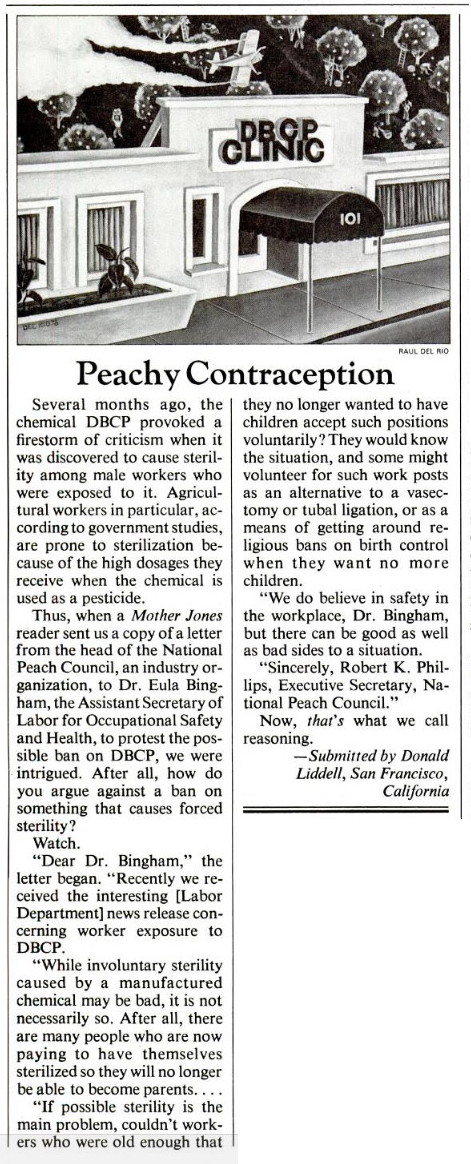
Posted By: Alex - Fri Nov 25, 2016 -
Comments (4)
Category: Government, Health, 1970s
Nothing To Do With Arbroath
I'm not a sentimental guy, but it's with a heavy heart that I report the at-least-temporary closing of Nothing To Do With Arbroath, likely the most amazing (and valuable to me) one-person blog on the intertubes. The proprietor (who has never, ever run an ad), an energizer-bunny-like Scotsman named Kevin, posts at least 10 "weird news" stories a day sharply at 6 a.m. on the Isles--and when I write "a day," I mean every single damn 24-hour-cycle, new-calendar-page day, every day, every, every, every. His whole archive is there, and y'all should pop over to Arbroath and leave him a Comment on his top page, which unfortunately will be unupdated for a while, because part of the reason he's backing off is his health. (He also cites similar Internet annoyances experienced by Yr Editor Chuck, who gets depressed daily by auto-loading pages, pop-ups, websites' over-converting to mobile and leaving us desktop old-timers behind--as well as "social media"'s snatching our visitors.) Kevin especially loves animal-heavy stories; he's got cute captions for cute ones and never met an exceptionally low-IQ'd animal in distress that he didn't consider newsworthy. I miss the hell out of him already, but we can hope his health improves and that he returns to the keyboard. (All right, I'll stop now before I get all maudlined up. I'm not good at this.)
Posted By: Chuck - Fri Nov 25, 2016 -
Comments (2)
Category:
Lush Head Woman
"Get a lush head woman and lose your health!"
Posted By: Paul - Fri Nov 25, 2016 -
Comments (0)
Category: Domestic, Music, 1940s, Alcohol
November 24, 2016
Hypnotist Seeks Humane Turkey Death
November 1956: Hypnotist Arthur Ellen urged President Eisenhower to put his Thanksgiving turkey in a trance before executing it, promising him that a hypnotized turkey "tastes better due to the absence of adrenalin in the bloodstream and plucks easier because the muscles holding the feathers are relaxed."
Port Angeles Evening News - Nov 19, 1956
It's not recorded whether Eisenhower took the advice of the hypnotist. However, Wikipedia notes that, "The Eisenhower Presidential Library says documents in their collection reveal that President Dwight Eisenhower ate the birds presented to him during his two terms."
The tradition of Presidential turkey pardons only officially began with Reagan, although both Kennedy and Nixon spared some birds.
Below: Eisenhower in 1954 feeds a cranberry to a soon-to-be-eaten Thanksgiving turkey.

Image source: White House Historical Association
Posted By: Alex - Thu Nov 24, 2016 -
Comments (0)
Category: Holidays, Thanksgiving, Hypnotism, Mesmerism and Mind Control, 1950s
Happy Thanksgiving 2016!
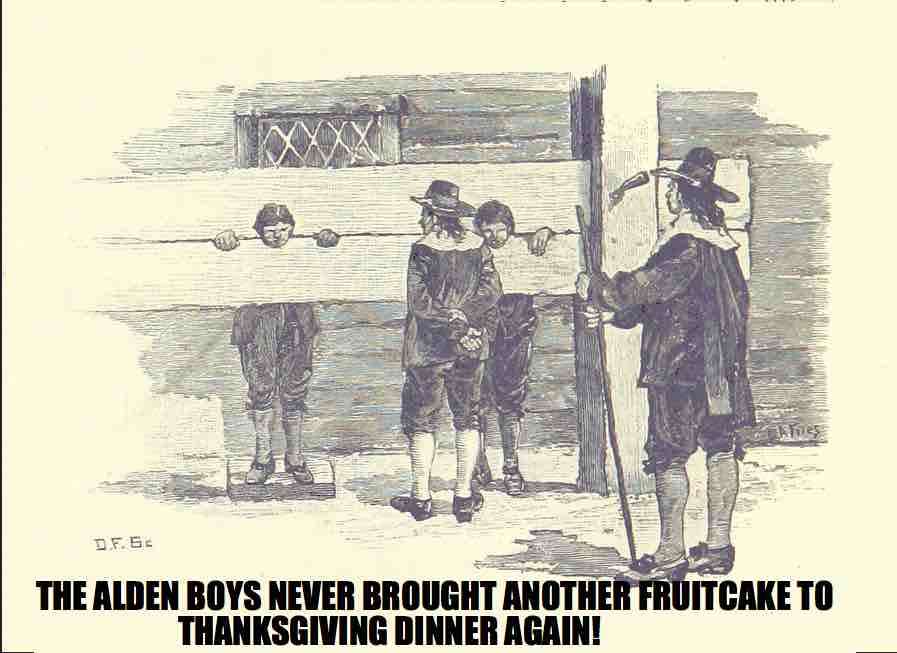
Posted By: Paul - Thu Nov 24, 2016 -
Comments (1)
Category: Crime, Food, Holidays
November 23, 2016
Homes for the deaf
Nov 1994: During a staff meeting, Toledo mayor Carty Finkbeiner offered a creative solution to the problem of homeowners bothered by airport noise. They should just sell their houses to deaf people. A few days later he offered a tearful apology, insisting that he had simply said it was "an interesting idea."The reality, of course, is that they sell to people willing to live with noise in exchange for getting a cheap house. I know that 'cause it's the trade-off I accepted when I bought my house (road noise, not airport noise).
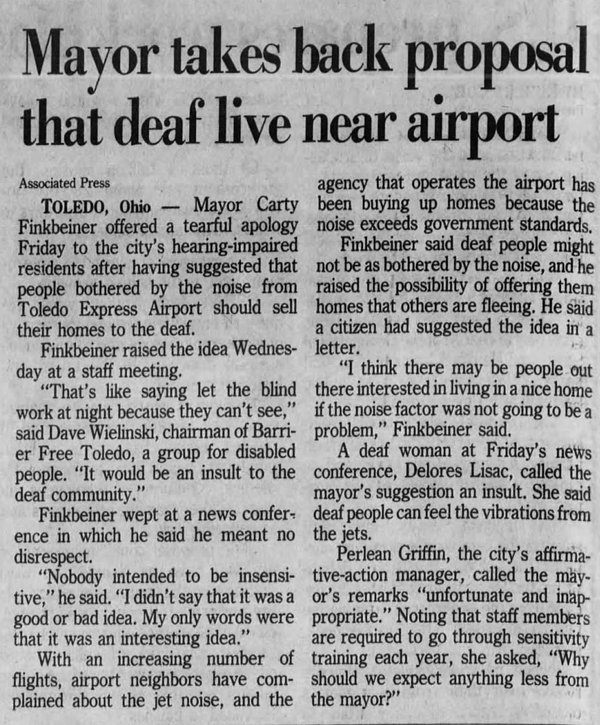
Detroit Free Press - Nov 5, 1994
Posted By: Alex - Wed Nov 23, 2016 -
Comments (5)
Category: Real Estate, 1990s
Andy Warhol Eats a Hamburger
Posted By: Paul - Wed Nov 23, 2016 -
Comments (3)
Category: Food, Pop Art, Bohemians, Beatniks, Hippies and Slackers, 1960s, 1970s
November 22, 2016
The Smell of The Donald
In 2004, Donald Trump lent his name to a perfume — DONALD TRUMP: THE FRAGRANCE. Now that he's going to be President, that means he's the first U.S. President to have a perfume named after him. The stuff is no longer for sale, but if you really want some, there's plenty of it to be found on eBay.The marketing literature that came with it promoted it as, " Luxurious. Confident. Persuasive. The compelling new scent for men. Power attracts."
Wendy Donahue, Chicago Tribune reporter, reviewed it and wrote:
Even Trump describes it as such: "It's a rose flavor; it's an orange flavor; it's lemony... What I did was I really relied on the great people of Estee Lauder. You know, so many companies wanted to do it. They gave me 30 different scents, all of which they felt were good, and I chose the one I liked."
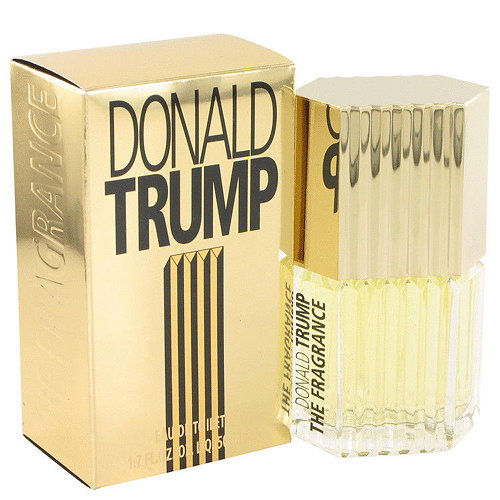
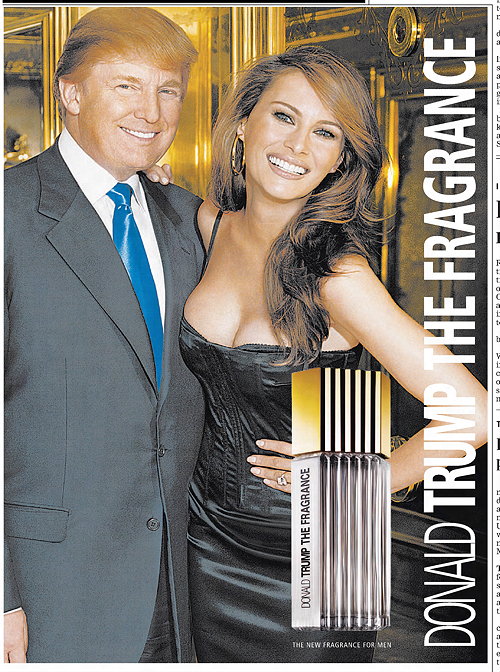
In a case of satirical prophecy, back in 1992 MAD magazine had imagined a Trump fragrance line. They called it "The Smell of The Donald."
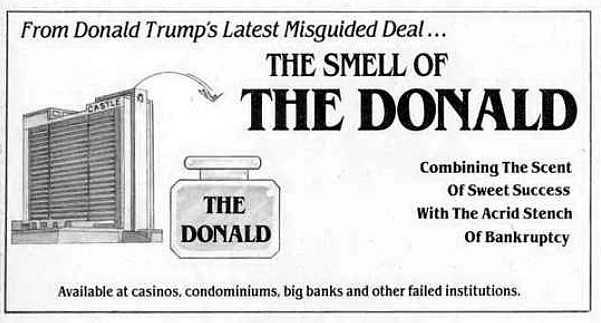
via mimifroufrou.com
Posted By: Alex - Tue Nov 22, 2016 -
Comments (8)
Category: Politics, Perfume and Cologne and Other Scents
November 21, 2016
Marlboro Beer
In the early 1970s, there was briefly such a thing as Marlboro Beer (trademark registration). Philip Morris (having just acquired Miller Brewing) figured that many people like to smoke as they drink beer, so surely a beer that shared the same brand name as their best-selling cigarette would be a success. But apparently test marketing indicated otherwise. So that was the end of Marlboro Beer.The few bottles of it that were sold now fetch a high price (as much as $1000) as collector's items.
via Box Vox 1
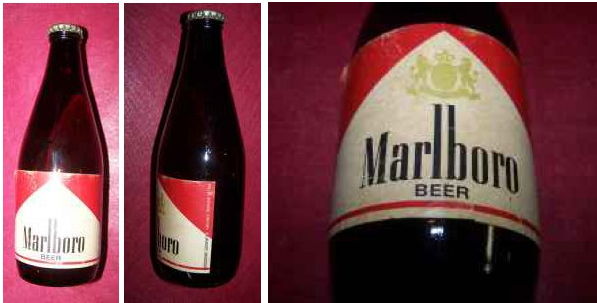
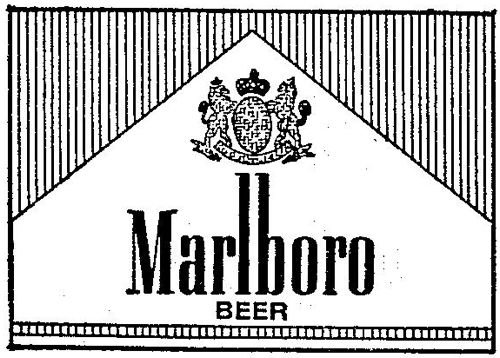
Posted By: Alex - Mon Nov 21, 2016 -
Comments (4)
Category: Smoking and Tobacco, 1970s, Alcohol
| Get WU Posts by Email | |
|---|---|

| Who We Are |
|---|
| Alex Boese Alex is the creator and curator of the Museum of Hoaxes. He's also the author of various weird, non-fiction books such as Elephants on Acid. Paul Di Filippo Paul has been paid to put weird ideas into fictional form for over thirty years, in his career as a noted science fiction writer. He has recently begun blogging on many curious topics with three fellow writers at The Inferior 4+1. Chuck Shepherd Chuck is the purveyor of News of the Weird, the syndicated column which for decades has set the gold-standard for reporting on oddities and the bizarre. Our banner was drawn by the legendary underground cartoonist Rick Altergott. Contact Us |
